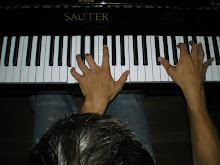One of the most striking observations of the west Ive ever encountered was written by an Egyptian novelist in the late 19th century. I forgot his name, and the work he wrote, but in it he expressed a bewilderment with the western worlds obsession with representation, reproduction and detached observation.
Westerners, in his mind, wanted nothing more than to place everything under glass to study. They wanted to re-create and represent something for scrutiny, for the academy. Life itself would become a museum, with this constant, futile aim to comprehend something through some kind of mirror, through a painting and a model, or a sculpture or a novel.
It could be argued that this mentality arises from the scientific method, from rationality, from the impulses of "modernism" in the western sense, and from the academic aim of expanding our knowledge. These mirrors westerners create may be, in the eyes of an egyptian, only two dimentional deceptive depictions of reality.
Listening to some of this, early notated music, looking at ancient cartography (Arab, Roman, Indian, Western Medieval), I cant help but think this wasnt an isolated western phenomenon. One cultivated by the academies, certianly. Machaut's gorgeous Notre Dame mass is music from the middle ages, written down hundreds of years ago and preserved like the scripture it recites. This begs the question, why was the notation of music seen in other literate civilizations? The arabs themselves during the period of Machaut were readers and critics of Plato and Aristotle long before Erasmus or Francis Bacon, and probably maintained much higher literacy rates among the general populations than in Western Europe at the time. Yet, why did they not leave an extensive musical notation system?
These were the people that introduced the Persian Tar to Spain, which evolved into the lute of Renaissance Europe and celebrated Spanish Guitar, these were people who influenced western musical development in this same period though trobador song. But where is the notation of this Arab music from the time of Machaut? We still have the traditions of Andalucian song in Morocco, Algeria, Tunesia, but was it a lack of this impulse for the preservation, representation and reproduction of music that kept beautiful arab script out of music? and is the fine-tuned precision of western notation the result of this same impulse?
Lahti
2 years ago

No comments:
Post a Comment